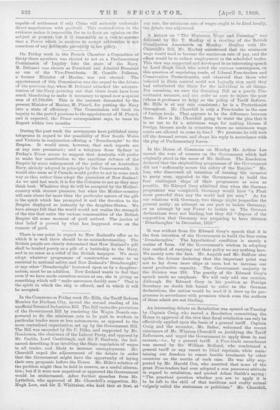In the Commons on Friday week Mr. Hills, the Tariff
Reform Member for Durham City, moved the second reading of his unofficial Sweated Industries Bill. The Bill varies the provisions of the Government Bill by rendering the Wages Boards em- powered to fix the minimum rate to be paid to workers in particular trades more or less autonomous, as opposed to the more centralised organisation set up by the Government Bill. The Bill was seconded by Sir C. Dilke, and supported by Mr. Henderson, the chairman of the Labour Party, and opposed by Mr. Carlile, Lord Castlereagh, and Sir F. Banbury, the last- named describing it as involving the State regulation bf wages in all trades, and likely to increase unemployment. Mr. Churchill urged the adjournment of the debate in order that the Government might have the opportunity of laying their own proposals before the House. Mr. Hills's solution of the problem might then be held in reserve, as a useful alterna- tive; but if it were now negatived or approved the Government would be embarrassed. After further speeches from Mr. Lyttelton, who approved of Mr. Churchill's suggestion, Mr. Hugh Law, and Sir T. Whittaker, who held that at first, at
any rate, the minimum rate of wages ought to be fixed locally, the debate was adjourned.










































 Previous page
Previous page